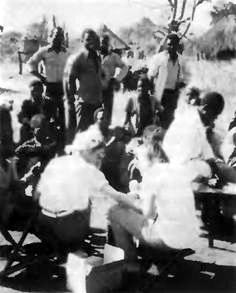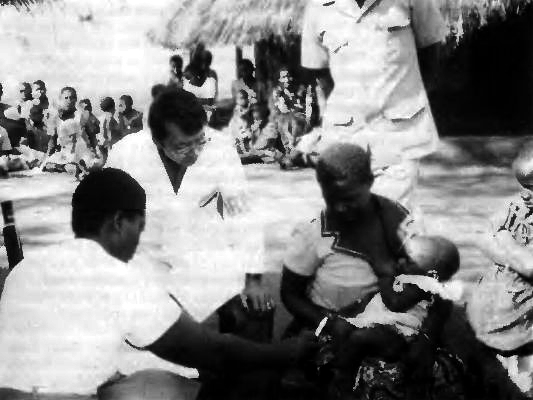![]()
The Words of the Huber Family
|
|
The Words of the Huber Family |

IRFF
staff dispensing medicines in one of the villages.
Africa has long been called the Dark Continent, an ancient land of mystery. It is now being exposed to the light of the twentieth century, and the rapid transformations brought about by the national independence movements after World War II have illuminated many serious problems. The immense human suffering due to the famine in the Sahel in North Africa has been the recent focus of concern of the advanced nations of the world, yet throughout the African continent, the lack of food, shelter, and basic health care are common and pervasive.
Medical services in many rural areas of Africa are quite scarce, because of the isolation of tribal societies and the lack of qualified personnel to attend them. Usually an entire governmental district is served by only one small hospital or clinic and staffed by a few general medical officers and nurses. Physicians available to visit patients are extremely rare. To combat this situation, IRFF has initiated mobile medical teams to reach out and help those people in need.

Dr.
Takigawa examines a child for skin infections.
At the invitation of Rev. Zulu, the Petauke district governor, IRFF conducted its first mobile medical services in Zambia. Rev. Zulu became familiar with IRFF through our movement's clinic in Lusaka, the capital, when he was minister of health. In conjunction with the provincial medical department, Dr. Noriyuki Takigawa, IRFF representative in Zambia, organized a primary health care team of two doctors, two nurses, one physiotherapist, and three research assistants. This staff was a combination of IRFF members and local people who were inspired by the idea. The project was designed to be an information-gathering tour of the region to identify the most critical health problems as well as to serve the village directly. On the basis of this initial service, IRFF is developing a long term strategy for improving health care throughout Zambia.
Because the Zambian government has been trying to implement primary health care (PHC), IRFF focuses on how PHC could be introduced to the village people most effectively. The medical team visited six villages and coordinated community meetings in each one to explain the meaning of PHC and the role of the IRFF health workers. After the initial meeting, the medical team went into action, examining and treating people for their ailments. At the same time IRFF researchers investigated the contributing causes of disease within the village environment. The most basic problems the people are facing include malnutrition, anemia, and infections from the non-hygienic water supply.
At the conclusion of the project, Dr. Takigawa and the staff reviewed the research to formulate a clear plan of approach for the future. The protection of water resources through covered concrete wells and the procedure of boiling water before use were highlighted. The team plans to return to the villages in the near future to implement the water security program. The hope of IRFF is to broaden this project throughout the country as a model of development assistance.